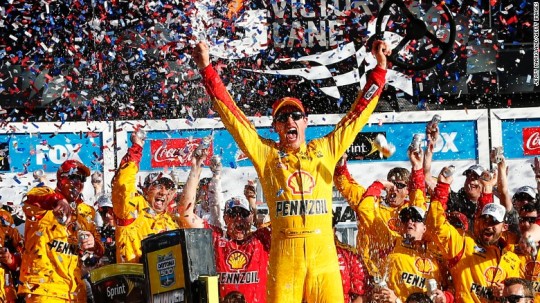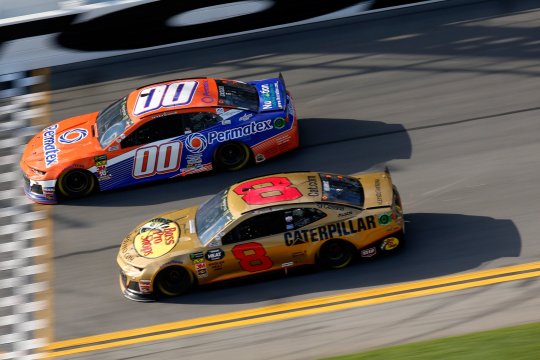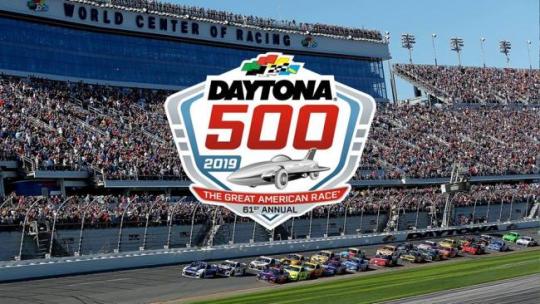#while in your house's press conference was just several people being gremlins
Photo


la knight giving adam cole his credit card as a response to cameron grimes paying kyle o’reilly cash
#la knight#adam cole#wrestling#my edits#my gifs#no but this was legitimately one of the funniest things that happened in this whole conference#stand and deliver's press conference was so SERIOUS#while in your house's press conference was just several people being gremlins#especially these two#also i love that adam just has a watch matching his entire outfit
54 notes
·
View notes
Text
Notes from the Daytona 500



I leave my house in Gainesville, Florida, at six a.m. with a pot cookie and a bar of Klonopin and drive toward the coast to cover the Daytona 500 for a trashy celebrity rag. Since the magazine doesn’t care about the actual race as much as what kind of jeans the celebrities in attendance are wearing, I must arrive early before the action starts. After two hours, I hit Richard Petty Road, which leads me to the race grounds and the press parking lot. I meet a man there who will show me around for the rest of the day. He is very nice and very helpful. I have already eaten the cookie.
The nice and helpful man whisks me to a special tent that I’m not technically allowed inside, but he drops the name of my magazine to the doorwoman, and they have a whispered conversation where I hear the name Juan Pablo repeated several times, and they let me in. I surreptitiously Google Juan Pablo and learn that he is the current star of The Bachelor, a television show where a hunk of meat is paraded before a group of women and told to fall in love. As we enter, the nice and helpful man tells me that the tent is reserved for celebrities like Juan Pablo, and also for a buzzing crowd of Fortune 500 CEOs. What he doesn’t say, but what becomes obvious in a little while, is that corporate money drives NASCAR. And these corporate bigwigs really seem to care about the race, since they get to advertise directly on the car and the driver. In return, the Daytona 500 offers them this tent with fake grass on the floor, and white picnic tables, and immaculately clad servers walking around with trays of single waffle sticks resting in cups of maple syrup. A sound system pumps Cee-Lo’s “Fuck You,” and a dance remix of “Call Me Maybe,” and “Girl” by Beck. The whole thing seems so not NASCAR. It’s just a bunch of rich, old white men milling around with gorgeous young paramours who flash hard eyes, and it’s clear that these people belong to an elite echelon, and they know it, and they are not interested in anyone who is not in that echelon. Judging by how they look at me, they can instantly smell one of their own--and more to the point, they can sniff out someone who doesn’t belong.
The very nice and helpful man steers me across the floor to Juan Pablo’s handler, who asks if I’d like to meet him. I tell her a lie and sit across from him with my pen and pad ready. In the nicest possible way, he refuses to talk to me. He produces a cell phone from his pocket and shows me a picture of a celebrity rag, my celebrity rag, with a headline that says, “The Bachelor’s Ex Tells All,” and then he shows me another picture of him sitting next to his ex, who is holding the same headline, both of them looking disgusted. “Do you see?” he asks, and I do see. Juan Pablo apologizes, and he is very nice, and he is very polite, and I don’t know how to explain that I also think it’s terrible the way they treat him, and that I would love to talk to him about what it’s like being a normal guy suddenly thrust into this vicious scene, and about why he’d agree to appear on a show like The Bachelor in the first place, but as far as treating him like an actual star whose opinions are newsworthy, well, I would need stronger drugs.
A similar thing happens with Nina Dobrev. Her handler tells me she isn’t entertaining the press today. I have no problem with that. I’ve struck out twice, but at least I got close enough to both of them to see their outfits, and that’s all I really need to satisfy the celebrity rag. The very nice and helpful man tells me I’ll have other opportunities--50 Cent will show up later, for example--and he begins introducing me around very politely to people he recognizes, corporate types mostly. These people are all very nice and charming in a disarming and genuine way, since they’re all here to get something out of this event. They all say the same thing: “I love your magazine! I read it all the time!” and though I know they’re all working an angle, I truly believe in their sincerity. It’s nice of them to say, honestly, so I don’t tell them that I just freelance for the magazine because it pays pretty well in an industry where good paychecks are like dinosaurs after the meteor. Instead, I watch these expert hucksters work the room, and I begin to understand the power of schmoozing. I also realize that when the schmoozers ask where you’re from, don’t say Gainesville, Florida, because their faces will drop, their eyes will cloud over, and they will check out of the conversation. You aren’t anywhere important. You can’t help them. Or maybe that’s just what I think is happening. I start to tell them that I spend part of the year in New York, which is a lie, but I will be moving there next year, so it’s kind of true. But, the thing is, these people remain very nice even after I think they’ve checked out of the conversation, and I don’t know why I am lying to them, and it makes me feel worse that some innate insecurity makes me need to lie so I can seem important to people who have only been nice to me, and who I need no favors from anyway. I am very confused morally, and the weed is taking hold.

After the introductions, I settle into a plush leather chair, gobble the Klonopin, and survey the room. The CEOs seem normal, and because no one recognizes them by face, they can hang out unmolested. The celebrities, on the other hand, exist inside bubbles and seem like caged animals. These bubbles are made of handlers, and bodyguards, and hangers on, and I get the sense that they are mirrored on the inside so the celebrities can remain devoted to their brands, their careers, themselves, without having to truly come to terms with how ultimately insignificant human life is. And in their defense, the bubbles offer them protection, which they need, because the press room, where I go next, swarms with a horde of leeches watching their every move, desperate to turn the slightest nothing into a story. And that horde never stops clawing for the latest scoop that will sell magazines. How could you not hide in a bubble? I’d make the same choice. You would too.
After a few minutes on the leather chair, the very nice and helpful man steers me to a press conference, where Chris Evans, Aloe Blacc, Luke Bryan, and Gary Sinise come into the room one by one. They each take a turn sitting alone on a stage facing a crowd of flabby beta males who shout pointless questions at them, and maybe these reporters, these flabby betas, are just normal people trying to pay mortgages and support families, but the way they fawn and grovel like deformed gremlins kneeling before a mighty conquistador is upsetting. And I grovel too, but I think it’s for different reasons. Mostly, I am too polite to say what I really think, so I pretend to grovel, and that might make me more of an asshole, as I gag while participating in the lobbing of mindless questions like so many slow-pitch softballs. Once the questions are over, photographers gather like lampreys to a shark, their shapeless bodies jostling for position while their snapping lenses search for a piece of flesh to capture. It is a gruesome scene, and you can’t help but feel that if the Earth opened and swallowed us all right there, no one’s life would be much worse for it.
Despite the inanity and triviality of it all, however, the celebrity rag wields enormous power. Even though the magazine I’m working for has never provided a single piece of information that anyone needed, I’ve never been treated so well as a reporter. That could be because NASCAR is about as cool as the Republican Party, and it is desperate for Hollywood endorsement in the hopes that some cool might rub off. (That’s a shame, too, because it really is an incredible sport once you get down there near the track and watch the cars scream by like a fleet of bloodthirsty Tyrannosaurs.) But it might also be because the sport still stinks of the Confederacy in a nation that is increasingly non-white. Whatever the reason, I am treated like a king here. As a reporter, I”m used to situations where I have to bother someone until I get what I want. I’m used to people trying to keep me out of important places, while I try to find a way in. I am not used to the way the very nice and helpful man walks me right up to the celebrities, pushes me to the front of every line, and lets me stand on chairs to get a better view.
And to be honest, there is a sort of twisted thrill that comes from having the power of the celebrity rag behind me. I have a lanyard that lets me walk straight past the fenced-in commoners waiting like cattle, red-faced and sweating in the oppressive Florida heat. I waltz right by the Port-O-Let, where a mob of smelly people waits to defecate into a plastic pit that festers in the sun, and by the terrible food tents where an interminable line waits for Bojangles chicken. With the very nice and helpful man at my side and the lanyard around my neck, I go to the VIP tent, piss in a bathroom that is nicer than my house, and eat slow-cooked beef ribs glazed twice with a cherry-habanera barbecue sauce, and Mexican street corn--grilled, then brushed with a mixture of mayonnaise, yogurt, and lime juice, and rolled in cotija cheese, cumin, and other spices. Then I go to a bar and select from half a dozen flavors of fancy fruit juices served in tiny plastic cups, and I take whatever I want without paying a cent. If this were actual journalism, every bit of it would be unethical. But the celebrity press plays by different rules. All I have to do here is provide a report on what the rich and famous do, say, and wear. Swag from NASCAR cannot possibly sway my work.

There’s a thrill that comes with the swag too, and maybe this thrill is what wealth and celebrity are all about. It is a sense of importance, a belief that because you are given these things, you deserve them. And how could the celebrities and CEOs not feel that way? We treat them like demigods. We give them presents they don’t need--Gary Sinise got a red electric guitar--and ask them leading question about how great they are. And why do we do this? Because they’re good at singing? Because they were okay in a few movies? Because they’re on a TV show that will be forgotten by the end of this sentence? It must do something unhealthy to them, and to us as well, but I can’t help feeling that there’s no reason to blame them. They’re just people who worked hard and got lucky; we are the ones treating them like Augustus Caesar.
The race begins as an afterthought, and a Florida thunderstorm comes immediately. The whole thing gets delayed for six hours, and I leave because I have what I need for my story, even though none of it is worth a damn. I am exhausted, and I can’t shake the feeling while driving home through the storm that we are sick, all of us. The way we treat the rich and famous must come from a deep well of mental illness, lousy priorities, and lizard-brain, god-worshipping instincts, and I have helped this hideous machine churn on. When I get home and begin to write my piece, my limbic system reels, not because I think I’m some great writer and this is below me, but because I know that it profoundly does not matter. It does not matter which celebrity arrived when, and whom they were with, and what they wore, and how close they stood to who, and how many selfies they took. No one needs this information. Ever.
And what’s truly sad is that the Daytona 500 is a freakout beyond belief--imagine the Super Bowl, and a country jamboree, and Woodstock put together. You don’t realize on TV how loud those cars are, how fast they go, how massive the track is. You don’t realize that the turns are pitched at such an angle that you can barely walk up them, and if you’re wearing flat-soled shoes, you will slip and the very nice and helpful man will have to hold onto your elbow like you’re a little old lady crossing the street. You don’t realize that they let the fans walk around the track before the race--thousands of them sitting on the infield, signing their names on the starting line, taking pictures of the cars parked in pit road--and that while the fans walk around, so do the world-famous drivers, just like that, elbowing their way past fat guys with cameras and pasty women with sunburns. What other sport allows that kind of access? Television also omits the carnival-like pageantry--the concerts on little stages dotting the outskirts of the track, the food tents billowing aromatic, oily smoke, the rows of RVs and buses with campers grilling in groups and getting drunk in the sun. There is a truly great story at this race. Hell, there are hundreds of them. And the celebrity press will miss them all.
I later learn that Dale Earnhardt Jr. won the race on the same track where thirteen years ago his father died in a grisly car wreck. Not only that, he did it on the night when another driver handled the legendary #3 car for the first time in competition since Earnhardt’s death. I know that my celebrity rag won’t publish that even if I write it. A man vanquishing the race that killed his father, next to the ghost of his father’s car? That isn’t a story to them.
But maybe, just maybe, Juan Pablo will find true love.
0 notes